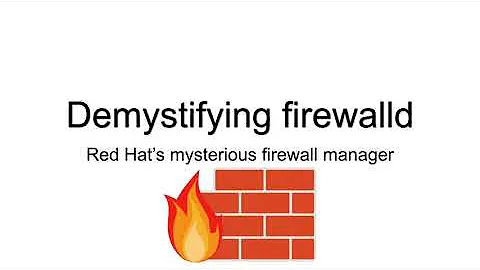Is firewalld the same as iptables?
Solution 1
With RHEL 7 / CentOS 7, firewalld was introduced to manage iptables. IMHO, firewalld is more suited for workstations than for server environments.
It is possible to go back to a more classic iptables setup. First, stop and mask the firewalld service:
systemctl stop firewalld
systemctl mask firewalld
Then, install the iptables-services package:
yum install iptables-services
Enable the service at boot-time:
systemctl enable iptables
Managing the service
systemctl [stop|start|restart] iptables
Saving your firewall rules can be done as follows:
service iptables save
or
/usr/libexec/iptables/iptables.init save
Solution 2
Firewalld is a new iptables frontend used as the default firewall interface in RHEL 7.
Use systemctl to turn firewalld off and disable it:
systemctl disable firewalld
systemctl stop firewalld
Related videos on Youtube
cdhit
Developer & Big data engineer & Cloudera Admin Search engineer & Recommendation system & Online advertising system
Updated on September 18, 2022Comments
-
cdhit over 1 year
I tried to close iptables on RHEL 7.2 using
chkconfig iptables offerror reading information on service iptables: No such file or directory
tried
/etc/init.d/iptables stoptoo, got-bash: /etc/init.d/iptables: No such file or directory
Then I googled it and got this :
systemctl status firewalldWhat is the difference between iptables and firewalld? And how do you close iptables?
How can I give maximum privilege to the machine?
-
 Rahul about 8 yearstry to run
Rahul about 8 yearstry to runwhich iptablesas root and make sure iptables is installed in your box. -
Dani_l about 8 yearsYou do realize redhat 7 is using systemd instead of sysv init? chkconfig and init.d are the wrong tools now
-
-
cdhit about 8 yearsI have executed this command, when I executed the
iptables-save > filewall.rules, I still can see from file filewall.rules there are a lot of filewall rules exist in it including ** -A FORWARD -o virbr0 -j REJECT --reject-with icmp-port-unreachable -A FORWARD -i virbr0 -j REJECT --reject-with icmp-port-unreachable**. What I expect is all the restrict are gone and grant the maximum privilege to this machine. -
fpmurphy about 8 yearsIn that case, you need to flush the existing rules using either -F or --flush

![IPTABLES [PART-1] : "UNDERSTANDING THE CONCEPT"](https://i.ytimg.com/vi/vbhr4csDeI4/hq720.jpg?sqp=-oaymwEcCNAFEJQDSFXyq4qpAw4IARUAAIhCGAFwAcABBg==&rs=AOn4CLBovKYd5heeT0eQFP4enqBJ_GCa1Q)


